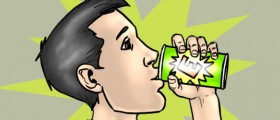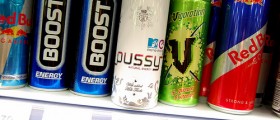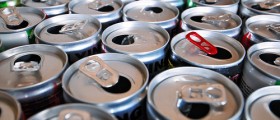
In today’s frantic and fast-paced world, where everyone wants to do as much as they can as soon as possible and where many wish the day would last for more than just 24 hours, it is no wonder that the industry of energy drinks is a growing one. People take energy drinks to improve their physical and mental performance, to stay alert and focused and to increase their endurance and stamina. However, certain issues should be considered when it comes to these drinks. One is their effectiveness and the others are potential health hazards of energy drinks.
Effectiveness of energy drinks
Some energy drinks aim to improve psychological state and mental energy, while others improve stamina and endurance, by energizing the body’s physiological components.
The factors that determine the effectiveness of an energy drink are its ingredients. Most of these drinks list caffeine as their main ingredient. Caffeine stimulates the nervous system and the psychological mechanism, creating a sensation of increased energy.
Caffeine is not necessarily listed on an energy drink, but it is often provided in the form of natural ingredients such as guarana and yerba mate.
On the other hand, energy drinks that list vitamin B complex, acai berry, ginseng or ginkgo biloba usually aim to stimulate the physiological energy levels. This is useful for athletes, people who feel physically exhausted and those who suffer from fatigue and a lack of stamina.
It is important to note that some energy drinks provide all the effects they promise to, but there are some that provide little or no energy at all. This depends on the amount of the active ingredients in the beverage. The effectiveness, of course, depends on the truthfulness of the manufacturer as well.
Health hazards of energy drinks
Like any other beverage or food, energy drinks should be taken in moderation. Long-term use of these drinks or their excessive consumption can have adverse effects on the human health.
Most energy drinks are not recommended for pregnant women, for children and for people who suffer from chronic diseases and conditions.
Caffeine can certainly be useful and beneficial, but if taken in excess, it can cause stomach problems, panic attacks, anxiety, heart palpitations and arrhythmia.
Most energy drinks contain a lot of sugars, which is bad for people who have diabetes, who are obese or who need to monitor their blood sugar levels for whatever reason.
The biggest risk associated with energy drinks is their combination with alcohol, which is something that, unfortunately, many people do. Caffeine acts as a stimulant while alcohol acts as a depressant, and the two opposite actions have a negative effect on the body. This leads to nausea, vomiting, heart problems, electrolyte imbalance, impaired motor and cognitive skills, and according to some experts, it causes damage to the liver.

















Your thoughts on this
Loading...